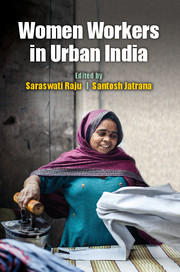Book contents
- Frontmatter
- Contents
- List of Figures
- List of Tables
- Preface
- 1 Setting the Backdrop
- 2 Women Workers in Urban India and the Cities
- 3 Gendered Vulnerabilities: Work-Life Trajectories of Female Domestic Workers in Jaipur
- 4 Occupational Domestication in a Post-Resettlement Context: An Analysis of Women's Work in Kannagi Nagar, Chennai
- 5 Old Jobs in New Forms: Women's Experiences in the Housekeeping Sector in Pune
- 6 Persistent Inequalities and Deepened Burden of Work? An Analysis of Women's Employment in Delhi
- 7 Spare Change for Spare Time? Homeworking Women in Banaras
- 8 Gender, Work and Space: Home-based Workers in Garment Industry in Kolkata
- 9 Labour Control and Responses: Women Workers in an Apparel Park in Kerala
- 10 New Urban Economic Spaces and the Gendered World of Work in Kolkata
- 11 Gender Equality and Women's Employment in the Banking Sector in India
- 12 Women Body Screeners and the Securitization of Space in Indian Cities
- Notes on Contributors
- Index
Preface
Published online by Cambridge University Press: 05 May 2016
- Frontmatter
- Contents
- List of Figures
- List of Tables
- Preface
- 1 Setting the Backdrop
- 2 Women Workers in Urban India and the Cities
- 3 Gendered Vulnerabilities: Work-Life Trajectories of Female Domestic Workers in Jaipur
- 4 Occupational Domestication in a Post-Resettlement Context: An Analysis of Women's Work in Kannagi Nagar, Chennai
- 5 Old Jobs in New Forms: Women's Experiences in the Housekeeping Sector in Pune
- 6 Persistent Inequalities and Deepened Burden of Work? An Analysis of Women's Employment in Delhi
- 7 Spare Change for Spare Time? Homeworking Women in Banaras
- 8 Gender, Work and Space: Home-based Workers in Garment Industry in Kolkata
- 9 Labour Control and Responses: Women Workers in an Apparel Park in Kerala
- 10 New Urban Economic Spaces and the Gendered World of Work in Kolkata
- 11 Gender Equality and Women's Employment in the Banking Sector in India
- 12 Women Body Screeners and the Securitization of Space in Indian Cities
- Notes on Contributors
- Index
Summary
Very often, cities are seen as spaces of anonymous identities and seamless opportunities. They have also been conceived as spaces of transition from traditions to modernity although its supposedly linear trajectory has long been questioned and contested. Indian cities, for example, continue to display an ambiguous mix of both — the so-called modern trends existing in close proximity with traditional values and anchoring. Women's work in labour market provides an interesting site to interrogate these contradictions.
The ‘shining India’ paradigm talks about the expanding new generation employment avenues of work for women and the recent official discourses eulogizes about rising incidences of employment amongst urban women. Much of the available literature, however, suggests that global capitalism, while providing new opportunities to women, not only exploits the prevailing gendered stereotypes, but it also rearticulates them.
The most recent accounts from India suggest that the growth in paid employment has taken place largely in the informal sector. Whether or not such informalization works in the interest of women is a debatable issue. While some maintain that emerging occupational avenues, such as those available in export processing zones or in case of Business Process Outsourcing (BPO), have helped women significantly to access labour market, there are others who contend that progressively increasing use of technology in urban context offers opportunities only to those who have education and appropriate skills. Moreover, it has been argued that even the export-oriented production is largely driven by informal work. Notwithstanding these propositions, the urban labour market has a range of women — in high-tech IT sectors working from posh offices or from home; they are in home-based work as petty producers; they are, at times, in the so-called masculine professions even as the absolute levels may vary and be miniscule. Intriguingly, their location in varied professions — high-end technically advanced work and/or petty work; home-based or outside homes — does not seem to necessarily alter the socially constructed gendered codes that are instrumental in assigning them places at the lower rungs of occupational ladder. More importantly, the hierarchical social order, encompassing overlapping caste, class and ethnic intersectionalities that typifies India in general seems to echo in the gendered structure of labour market, whether they are salaried, self-employed or at home as paid as well as unpaid family labour.
- Type
- Chapter
- Information
- Women Workers in Urban India , pp. xi - xivPublisher: Cambridge University PressPrint publication year: 2016



